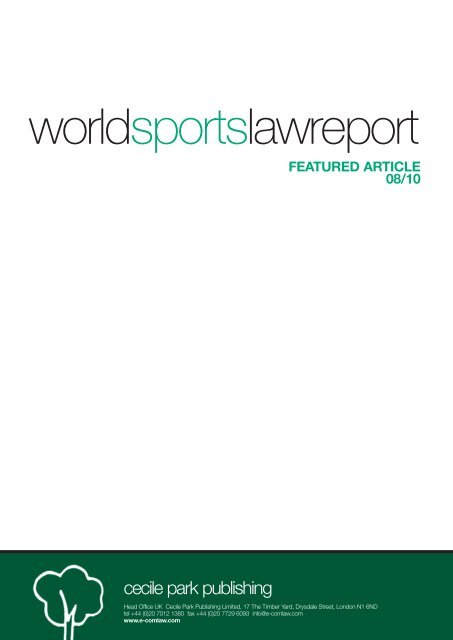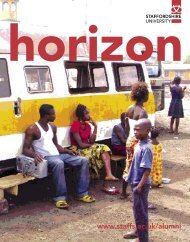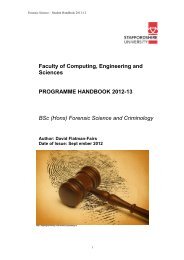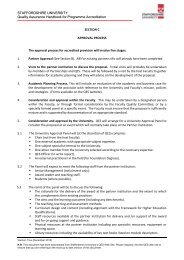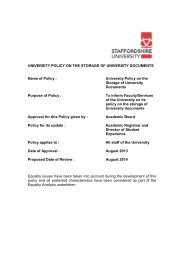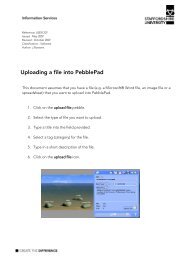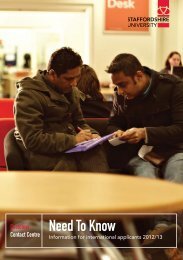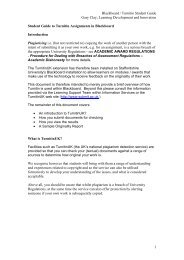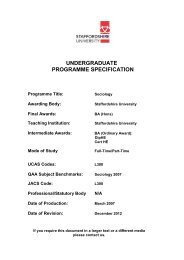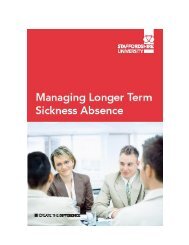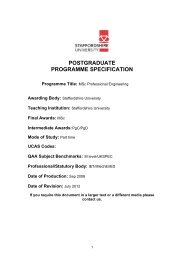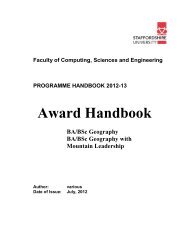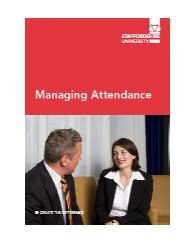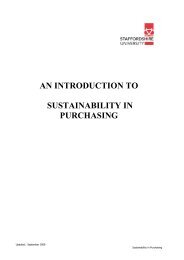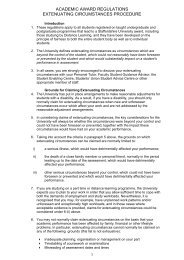Ambush marketing: FIFA's rights protection programme
Ambush marketing: FIFA's rights protection programme
Ambush marketing: FIFA's rights protection programme
Create successful ePaper yourself
Turn your PDF publications into a flip-book with our unique Google optimized e-Paper software.
worldsportslawreport<br />
cecile park publishing<br />
FEATURED ARTICLE<br />
08/10<br />
Head Office UK Cecile Park Publishing Limited, 17 The Timber Yard, Drysdale Street, London N1 6ND<br />
tel +44 (0)20 7012 1380 fax +44 (0)20 7729 6093 info@e-comlaw.com<br />
www.e-comlaw.com
ADVERTISING<br />
<strong>Ambush</strong> <strong>marketing</strong>: FIFA’s<br />
<strong>rights</strong> <strong>protection</strong> <strong>programme</strong><br />
The 2010 FIFA World Cup will be<br />
remembered in the Netherlands not<br />
only for the country’s excellent<br />
performance, but also for FIFA’s<br />
attempted prosecution of women<br />
wearing orange miniskirts bearing<br />
Bavaria Beer’s logo. Kris Lines and<br />
Jon Heshka, sports law Professors,<br />
examine the effectiveness of FIFA’s<br />
methods of protecting itself from<br />
ambush <strong>marketing</strong>, how FIFA’s<br />
<strong>rights</strong> <strong>protection</strong> is written into<br />
legislation and how this applied in<br />
South Africa.<br />
Amidst the buzzing of the<br />
Vuvuzela’s and the occasional<br />
officiating error, the 2010 FIFA 1<br />
World Cup South Africa(tm) will<br />
also be remembered for the<br />
expulsion of 36 orange mini-skirt<br />
wearing women from a match and<br />
the subsequent prosecution (and<br />
then dropping) of charges against<br />
the two alleged ‘ringleaders’ behind<br />
the incident. Whilst titillating, this<br />
is not just a story about beautiful<br />
women being used to market a<br />
product. The real story is about the<br />
lengths to which companies will go<br />
to exploit loop-holes in the existing<br />
law and what implications these<br />
campaigns have for tackling<br />
counter-insurgency actions at<br />
future events.<br />
The article will conclude by<br />
examining how FIFA and<br />
Anheuser-Busch (the official beer<br />
sponsor) were so comprehensively<br />
ambushed that Bavaria rocketed<br />
from unmeasurable before the<br />
ambush to the fifth most visited<br />
beer website in the UK 2 , while<br />
Nike’s unofficial ‘Write the Future’<br />
campaign was widely viewed as the<br />
most successful <strong>marketing</strong><br />
campaign of the World Cup 3 .<br />
<strong>Ambush</strong> <strong>marketing</strong><br />
The phrase ‘ambush <strong>marketing</strong>’<br />
was coined in the 1980s to describe<br />
02<br />
attempts to capitalise on the<br />
goodwill, brand and reputation of<br />
a mega-event either by creating a<br />
false and/or unauthorised<br />
association with the right’s holder,<br />
or by intruding upon an event to<br />
gain publicity for their own brand<br />
or product. Infamous examples of<br />
previously successful ambushes<br />
include Nike’s blitzkrieg plastering<br />
of the Atlanta 1996 Summer<br />
Olympic Games at the expense of<br />
Reebok and American Express’s<br />
clever 1992 tagline poking fun at<br />
how visitors to the Barcelona<br />
Olympics Games ‘do not need a<br />
VISA’.<br />
With the World Cup(tm)<br />
representing the confluence of<br />
business and the beautiful game 4 , it<br />
should come as no surprise that<br />
the 2010 event was a prime target<br />
for ambush <strong>marketing</strong>. This article<br />
does not challenge FIFA’s need to<br />
defend its commercial interests<br />
against ambush - after all, their<br />
official six top-tier partners 5 ,<br />
sponsors 6 and national supporters 7<br />
all invested considerably for<br />
‘guaranteed exclusive association’<br />
with the World Cup(tm) - but<br />
rather the article questions the<br />
effectiveness of the anti-ambushing<br />
methods employed by FIFA.<br />
FIFA’s <strong>rights</strong> <strong>protection</strong><br />
<strong>programme</strong> is primarily founded<br />
on an aggressive <strong>protection</strong> of their<br />
trademark and copy<strong>rights</strong> through<br />
national and international mark<br />
<strong>protection</strong>, the tort of passing off,<br />
contractual terms and anti-trust<br />
laws. However, while these tools<br />
have had some success preventing<br />
traditional trademark violation<br />
and counterfeiting 8 , increasingly<br />
they are having little effect against<br />
the sophisticated modern<br />
ambusher, who operates in the<br />
greyer (or perhaps that should be<br />
more orange!) areas of the law. To<br />
combat these loopholes, event<br />
organisers have used political and<br />
commercial clout to require host<br />
countries to promulgate even<br />
stricter laws to further protect the<br />
<strong>rights</strong> vested in the events (in the<br />
case of South Africa, this was<br />
through a tightening of the<br />
Merchandise Marks Act 1941) 9 .<br />
However, even despite the<br />
restrictive nature of this legislation,<br />
it is still possible for ambushes to<br />
occur. For example, although a<br />
rival company’s <strong>marketing</strong><br />
campaign might detract from and<br />
dilute a sponsor’s message, unless<br />
the campaign directly infringes a<br />
specified protected mark, a sponsor<br />
or event organiser has no legal<br />
right to block the offending<br />
advertising 10 . This can be illustrated<br />
in South Africa by FIFA’s failure to<br />
include the Vuvuzela within the<br />
terms listed as part of the<br />
Merchandise Marks Act, thereby<br />
presenting companies 11 with an<br />
unprotected iconic image to use in<br />
an advert.<br />
<strong>Ambush</strong> <strong>marketing</strong> by<br />
association (Nike)<br />
Nike’s ‘Write the Future’ campaign<br />
is an orthodox example of ambush<br />
<strong>marketing</strong> by associating a product<br />
indirectly with an event. However,<br />
while the aim was orthodox, the<br />
method of communication was<br />
anything but. Nike centred the<br />
campaign on a three minute video<br />
clip with slick production values,<br />
that explored the ‘what if’ concept<br />
during a fictional football<br />
tournament. The launch of the<br />
video was premiered on Youtube,<br />
Facebook and during the final of<br />
the UEFA Champions League to<br />
widespread critical and public<br />
acclaim 12 . Indeed, at the time of<br />
writing, the official Youtube video<br />
had received a staggering 19.5<br />
million hits!<br />
This campaign was further<br />
extended by Nike during the<br />
tournament through ‘Write the<br />
Headline’ 13 , a 44 metre high colour<br />
LED display projected onto the<br />
side of Johannesburg’s Southern<br />
Life Centre. Fans could also<br />
world sports law report august 2010
interact with this projection<br />
through social media in order to<br />
display up to 100 messages of<br />
support for their team every<br />
evening. Taken together, the<br />
campaign was so successful that<br />
both Nielson and MEC report that<br />
Nike was the brand the public<br />
most linked to the tournament 14 ,<br />
despite it not being an official<br />
partner.<br />
The problem for FIFA is that<br />
while the Merchandise Marks Act<br />
might protect trademarks and<br />
words associated with the World<br />
Cup, Nike merely used football<br />
references focused on the<br />
individual athletes it sponsored.<br />
The lesson here is that while the<br />
Olympic Games prevents<br />
individual Olympians and teams<br />
from becoming involved in<br />
advertising during the Games, the<br />
same is not necessarily true for<br />
events staged by FIFA or other<br />
international federations.<br />
<strong>Ambush</strong> <strong>marketing</strong> by<br />
intrusion (Bavaria)<br />
In 2006, Bavaria gained<br />
international attention when more<br />
than one thousand Dutch fans<br />
were required to take off their<br />
Bavaria-branded orange<br />
lederhosen at a 2006 World Cup<br />
match pitting Holland against the<br />
Ivory Coast. That same year, the<br />
company successfully defended a<br />
lawsuit launched by Heineken, the<br />
official sponsor of the Dutch<br />
football association (KNBV) and<br />
Holland’s biggest brewery. In<br />
ruling in its favour, the President<br />
Court of Utrecht held that the<br />
KNBV could not refuse access to<br />
Euro 2006 preparation games to<br />
ticket holders wearing Bavariabranded<br />
lederhosen 15 .<br />
Emboldened by their success at<br />
the 2006 World Cup(tm) and<br />
tearing a page from the Dim Dim<br />
Underwear Girls playbook at the<br />
Rugby World Cup 2007 in France 16 ,<br />
Bavaria combined the two tactics<br />
Trade mark,<br />
contractual<br />
terms and<br />
passing off<br />
give limited<br />
<strong>protection</strong><br />
against<br />
ambushes,<br />
but they<br />
alone have<br />
proven<br />
inadequate<br />
in South Africa. On 14 June 2010,<br />
36 women entered Soccer City<br />
stadium in Johannesburg for the<br />
first round World Cup match<br />
between Holland and Denmark. In<br />
true insurgency style, the girls<br />
disguised themselves by wearing<br />
red Danish outfits and allegedly<br />
using a decoy group of fans on one<br />
side of the stadium to divert the<br />
attention of security for their<br />
entrance in a different location.<br />
Once inside the stadium, the girls<br />
stripped off to reveal orange minidresses,<br />
and midway through the<br />
game, started dancing en masse in<br />
the stands 17 . Predictably, this<br />
spectacle attracted the attention of<br />
the other spectators, media and<br />
FIFA, resulting in the women being<br />
expelled from the game at half<br />
time. Shortly afterwards, Barbara<br />
Castelein and Mirte Nieuwpoort<br />
were arrested under s 15.A of the<br />
Merchandise Marks Act for the<br />
‘unauthorised use of a trade mark<br />
at a protected event’ and ‘entry into<br />
a designated area while in<br />
possession of a prohibited<br />
commercial object’, while the ITV<br />
football commentator Robbie<br />
Earle, who provided the tickets to<br />
the girls, was subsequently<br />
dismissed by the broadcaster.<br />
Although the General Terms and<br />
Conditions to World Cup(tm)<br />
tickets now explicitly prohibit<br />
ticket holders from doing anything<br />
which could result in an<br />
unauthorised commercial<br />
association with FIFA or the World<br />
Cup(tm) to the detriment of FIFA<br />
or its commercial affiliates 18 , the<br />
problem FIFA had was that orange<br />
clothing is part of the national<br />
heritage of the Netherlands. In<br />
order to skirt any accusations of<br />
ambush <strong>marketing</strong>, Bavaria had<br />
also significantly reduced the size<br />
of the label on the dresses to a<br />
comparable size to the Nike<br />
swoosh on shirts. As such, it is<br />
difficult to reconcile the ban on<br />
any Netherlands supporter<br />
ADVERTISING<br />
unofficially adopting the Bavaria<br />
dresses as their own, when other<br />
supporters wear jeans or other<br />
clothing that display more visible<br />
logos and branding.<br />
Just as the Constitutional Court<br />
ruled in South African Breweries v<br />
Laugh It Off Promotions 19 , FIFA<br />
would have had to show evidence<br />
that Anheuser-Busch, Inc. would<br />
have suffered substantial economic<br />
harm through lost Budweiser sales<br />
due to the reduced commercial<br />
magnetism of their mark as a<br />
result of the Bavaria ambush and<br />
that both its and Anheuser-Busch’s<br />
trade marks were compromised to<br />
such an extent that it should have<br />
overridden the women’s right to<br />
wear orange dresses. Given this,<br />
FIFA prudently chose to drop the<br />
charges.<br />
Winning hearts and minds<br />
Underlying any action by a right’s<br />
holder ought to be a risk<br />
assessment weighing the pros and<br />
cons of any particular course of<br />
action. One option is to do<br />
nothing and let the story blow over<br />
and risk being seen to tacitly accept<br />
this conduct. Another is the ‘name<br />
and shame’ tactic championed so<br />
successfully by the IOC 20 against<br />
Nike in 1996, when the retailer<br />
dropped their ‘didn’t win silver, lost<br />
gold’ campaign. However, there are<br />
risks with this approach. Rather<br />
than being buried in an avalanche<br />
of advertising, good will and good<br />
stories related to the sporting<br />
event, the effect of the ‘name and<br />
shame’ approach is to amplify the<br />
ambusher’s message. Putting the<br />
ambusher in the spotlight can also<br />
play to the adage ‘there is no such<br />
thing as bad publicity’,<br />
marginalising the official sponsor.<br />
Indeed, what did FIFA think would<br />
happen when it paraded 36 very<br />
photogenic and tearful girls in<br />
short orange dresses in front of the<br />
world’s media?<br />
While it does not help FIFA’s<br />
world sports law report august 2010 03
ADVERTISING<br />
cause that television cameras<br />
gravitated towards the Bavaria<br />
women at the 2010 World<br />
Cup(tm) just as TF1’s21 cameras<br />
tracked the Dim Dim Girls at the<br />
Rugby World Cup 2007, the key to<br />
successful counter-insurgency<br />
actions is preparation and<br />
anticipation. If <strong>rights</strong> holders can<br />
identify potential ambushes<br />
quickly and require their<br />
broadcasters not to show situations<br />
demonstrative of an ambush - for<br />
example as the London Marathon<br />
responded to a Nike ambush by<br />
shooting from angles which did<br />
not show Nike posters on bus<br />
shelters and obscuring from<br />
television view a huge billboard -<br />
ambushers will not receive the<br />
publicity they seek.<br />
In responding as it did, FIFA<br />
anticipated public support, if not<br />
sympathy, for its cause. The court<br />
of public opinion, however, seemed<br />
to be firmly on Bavaria’s side. FIFA<br />
did not have the legal tools in trade<br />
mark law to build a compelling<br />
case to the courts, nor to convince<br />
the public that it or Anheuser-<br />
Busch was harmed by the miniskirt<br />
escapade and as a result, its<br />
response to the ambush appeared<br />
heavy-handed and<br />
disproportionate. Both the Nike<br />
and Bavaria examples demonstrate<br />
that the future of ambush<br />
<strong>marketing</strong> is very much archetypal<br />
guerrilla warfare - a small and<br />
highly mobile campaign supported<br />
by the public, acting against a<br />
larger unwieldy force. Ironically,<br />
the more that event <strong>rights</strong> holders<br />
rely on draconian and heavy<br />
handed statutory <strong>protection</strong>s, the<br />
more they become fixed targets.<br />
By pursuing a criminal case<br />
against two women over what<br />
amounted to essentially a<br />
commercial dispute simply for<br />
wearing a plain orange dress, FIFA<br />
was always going to elicit sympathy<br />
for the underdog brewer.<br />
04<br />
Finale<br />
Companies which engage in this<br />
type of ambush <strong>marketing</strong> are too<br />
shrewd to make elementary IPR 22<br />
mistakes which would leave them<br />
vulnerable to legal courses of<br />
action. The culprits are among the<br />
biggest corporate entities in the<br />
world 23 , with seasoned and<br />
streetwise legal and <strong>marketing</strong><br />
machines prepared to exploit<br />
weaknesses in IPR law. It is in this<br />
light that the vulnerabilities of<br />
trade mark law in respect to sport<br />
are laid bare.<br />
There is an argument that<br />
ambush <strong>marketing</strong> presents a clear<br />
and present danger to corporate<br />
sponsorship and effective<br />
capitalisation of a sporting<br />
organisation’s commercial<br />
potential. Trade mark, contractual<br />
terms and passing off give limited<br />
<strong>protection</strong> against ambushes, but<br />
they alone have proven inadequate<br />
to effectively protect against<br />
sophisticated campaigns. Although<br />
<strong>rights</strong> holders have responded by<br />
requiring host nations to<br />
promulgate additional legislation -<br />
such as the London Olympic<br />
Games and Paralympic Games Act<br />
2006 and the London Olympic<br />
Association Right - to further<br />
safeguard their intellectual<br />
property <strong>rights</strong>, the extent to which<br />
such an approach will be effective<br />
in law and accepted by business<br />
and the public is undetermined. As<br />
FIFA experienced in South Africa,<br />
even though it thought it was<br />
legally in the right, in the eyes of<br />
the rest of the world, its actions<br />
were offside.<br />
Kris Lines Head of Sports Law<br />
Staffordshire University, Stoke on Trent,<br />
England<br />
Jon Heshka Assistant Professor<br />
Thompson Rivers University, Kamloops,<br />
Canada<br />
k.m.lines@staffs.ac.uk<br />
jheshka@tru.ca<br />
1. Fédération Internationale de Football<br />
Association.<br />
2. The other beers were Carling, Cobra,<br />
Budweiser and Carlsberg.<br />
3. http://www.football<strong>marketing</strong>.com/2010/06/11/nike-adbeats-official-sponsors-for-online-buzz/<br />
4. Conservative estimates suggest that<br />
FIFA will generate $3.2 billion in 2010<br />
and will attract a television audience of<br />
upwards of 28 billion people.<br />
5. Adidas, Coca-Cola, Emirates, Hyundai<br />
KIA Motors, Sony, and VISA.<br />
6. Budweiser, Castrol, Continental,<br />
McDonalds, MTN, Mahindra Satyam,<br />
Seara, and Yingli Solar.<br />
7. BP South Africa, FNB, Neo Africa,<br />
Prasa, Shanduka-Aggreko, and Telkom.<br />
8. In 2006, there were 3,300 <strong>rights</strong><br />
infringements in 84 countries with less<br />
than 20% ending in litigation.<br />
9. Discussed in detail by Michael Murphy<br />
in his article ‘<strong>Ambush</strong> <strong>marketing</strong>:<br />
sanctions and state legislation’,<br />
published in Volume 7, Issues 10 and 11<br />
(October and November 2009) of World<br />
Sports Law Report.<br />
10. J Heshka, ‘Rules and Rogues -<br />
VANOC’s approach to ambush<br />
marketers may keep the lawyers happy<br />
but the strategy is backfiring’ (2010)<br />
Marketing Magazine 37.<br />
11. For example Nestle KitKat, or<br />
Carling.<br />
12. http://www.football<strong>marketing</strong>.com/2010/06/11/nike-adbeats-official-sponsors-for-online-buzz/<br />
13. http://www.youtube.com/watch?<br />
v=pzBUIsX_gZk&feature=player_<br />
embedded#<br />
14. http://blog.nielsen.com/nielsenwire/<br />
media_entertainment/nike-ambushesofficial-world-cup-sponsors/<br />
15. Presentation by Marinus Vromans of<br />
Van den Eynde Legal, ‘Sports<br />
Management and Marketing<br />
Agreements’ given at the Sixth<br />
International Sports Law and Taxation<br />
Seminar in Amsterdam on 3-4<br />
December 2009.<br />
http://www.vdelegal.be/cariboost_files/<br />
VDE_20Amsterdam_20_28<br />
MARINUS_29.pdf<br />
16. http://www.youtube.com/watch?<br />
v=dl3q6Jy4iKk&feature=related<br />
17. http://www.youtube.com/watch?<br />
v=4TkhHLW_iV8&feature=related<br />
18. Such an association could by way of<br />
an unauthorised use of logos or<br />
otherwise. Ticket holders are further<br />
prohibited from using, wearing,<br />
possessing or holding promotional or<br />
commercial objects.<br />
19. South African Breweries (Finance) BV<br />
trading as SAB Mark International v<br />
Laugh It Off Promotions CC (All SALR (2)<br />
2003 454 (C)).<br />
20. International Olympic Committee.<br />
21. French television channel.<br />
22. Intellectual property <strong>rights</strong>.<br />
23. Includes Kodak, Nike, American<br />
Express, Puma, and Pepsi.<br />
world sports law report august 2010
e-commerce law & policy<br />
Many leading companies, including Amazon, BT, eBay, FSA, Orange, Vodafone,<br />
Standard Life, and Microsoft have subscribed to ECLP to aid them in solving the<br />
business and legal issues they face online.<br />
ECLP, was nominated in 2000 and again in 2004 for the British & Irish Association<br />
of Law Librarian’s Legal Publication of the Year.<br />
A twelve month subscription is £390 (overseas £410) for twelve issues and<br />
includes single user access to our online database.<br />
e-commerce law reports<br />
You can now find in one place all the key cases, with analysis and comment, that<br />
affect online, mobile and interactive business. ECLR tracks cases and regulatory<br />
adjudications from around the world.<br />
Leading organisations, including Clifford Chance, Herbert Smith, Baker &<br />
McKenzie, Hammonds, Coudert Brothers, Orange and Royal Mail are subscribers.<br />
A twelve month subscription is £380 (overseas £400) for six issues and<br />
includes single user access to our online database.<br />
data <strong>protection</strong> law & policy<br />
You can now find in one place the most practical analysis, and advice, on how to<br />
address the many problems - and some opportunities - thrown up by data <strong>protection</strong><br />
and freedom of information legislation.<br />
DPLP’s monthly reports update an online archive, which is an invaluable research<br />
tool for all those who are involved in data <strong>protection</strong>. Data acquisition, SMS <strong>marketing</strong>,<br />
subject access, Freedom of Information, data retention, use of CCTV, data<br />
sharing and data transfer abroad are all subjects that have featured recently.<br />
Leading organisations, including the Office of the Information Commissioner, Allen<br />
& Overy, Hammonds, Lovells, BT, Orange, West Berkshire Council, McCann<br />
Fitzgerald, Devon County Council and Experian are subscribers.<br />
A twelve month subscription is £355 (public sector £255, overseas £375)<br />
for twelve issues and includes single user access to our online database.<br />
priority order form<br />
FAX +44 (0)20 7729 6093<br />
CALL +44 (0)20 7012 1380<br />
EMAIL dan.towse@e-comlaw.com<br />
ONLINE www.e-comlaw.com<br />
POST Cecile Park Publishing 17 The Timber Yard, Drysdale Street, London N1 6ND<br />
cecile park publishing<br />
Head Office UK Cecile Park Publishing Limited, 17 The Timber Yard, Drysdale Street, London N1 6ND<br />
tel +44 (0)20 7012 1380 fax +44 (0)20 7729 6093 info@e-comlaw.com<br />
www.e-comlaw.com<br />
Registered number 2676976 Registered address 141 Wardour Street, London W1F 0UT VAT registration 577806103<br />
Name<br />
Job Title<br />
Department Company<br />
Address<br />
Address<br />
City State<br />
Country Postcode<br />
Telephone Fax<br />
Email<br />
1<br />
2<br />
3<br />
world online gambling law report<br />
You can now find in one place analysis of the key legal, financial and regulatory<br />
issues facing all those involved in online gambling and practical advice on how<br />
to address them. The monthly reports update an online archive, which is an<br />
invaluable research tool for all those involved in online gambling.<br />
Poker, payment systems, white labelling, jurisdiction, betting exchanges, regulation,<br />
testing, interactive TV and mobile gaming are all subjects that have featured<br />
in WOGLR recently.<br />
Leading organisations, including Ladbrokes, William Hill, Coral, Sportingbet,<br />
BskyB, DCMS, PMU, Orange and Clifford Chance are subscribers.<br />
A twelve month subscription is £485 (overseas £505) for twelve issues<br />
and includes single user access to our online database.<br />
world sports law report<br />
WSLR tracks the latest developments from insolvency rules in football, to EU<br />
Competition policy on the sale of media <strong>rights</strong>, to doping and probity. The<br />
monthly reports update an online archive, which is an invaluable research tool<br />
for all involved in sport.<br />
Database <strong>rights</strong>, sponsorship, guerilla <strong>marketing</strong>, the Court of Arbitration in<br />
Sport, sports agents, image <strong>rights</strong>, jurisdiction,domain names,ticketing and<br />
privacy are subjects that have featured in WSLR recently.<br />
Leading organisations, including the England & Wales Cricket Board, the<br />
British Horse Board, Hammonds, Fladgate Fielder, Clarke Willmott and<br />
Skadden Arps Meagre & Flom are subscribers.<br />
A twelve month subscription is £485 (overseas £505) for twelve issues<br />
and includes single user access to our online database.<br />
n Please enrol me as a subscriber to e-commerce law & policy at £390 (overseas £410)<br />
n Please enrol me as a subscriber to e-commerce law reports at £380 (overseas £400)<br />
n Please enrol me as a subscriber to data <strong>protection</strong> law & policy at £355 (public sector £255, overseas £375)<br />
n Please enrol me as a subscriber to world online gambling law report at £485 (overseas £505)<br />
n Please enrol me as a subscriber to world sports law report at £485 (overseas £505)<br />
All subscriptions last for one year. You will be contacted at the end of that period to renew your subscription.<br />
Please invoice me Purchase order number<br />
Signature Date<br />
I enclose a cheque for the amount of<br />
made payable to ‘Cecile Park Publishing Limited’<br />
Please debit my credit card VISA n MASTERCARD n<br />
Card No. Expiry Date<br />
Signature<br />
VAT No. (if ordering from an EC country)<br />
Date<br />
Periodically we may allow companies, whose products or services might be of interest, to send you information.<br />
Please tick here if you would like to hear from other companies about products or services that may add value to your subscription. n


